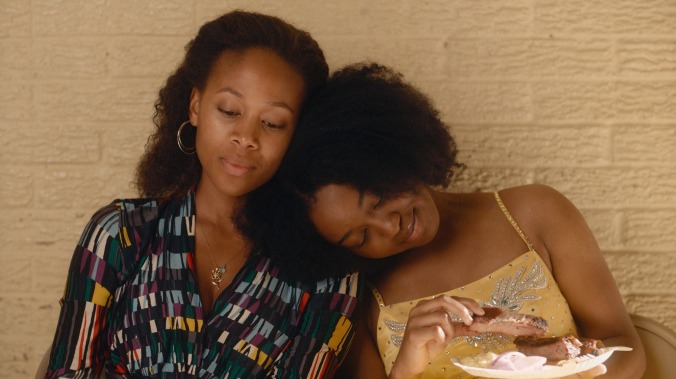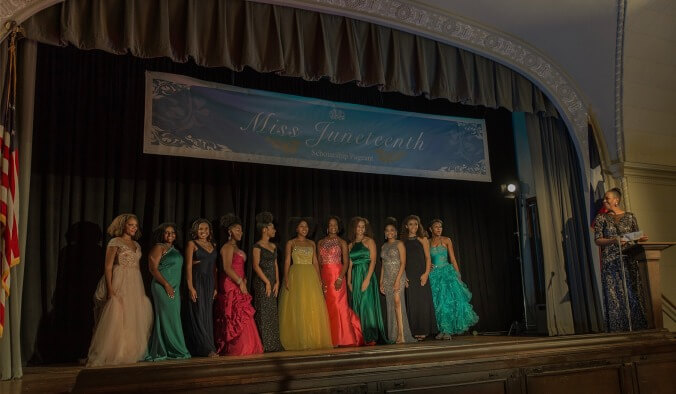Held annually on the holiday commemorating the end of slavery in the United States, Miss Juneteenth pageants reflect the Southern affinity for pomp, circumstance, and puffy dresses. They also offer a unique and affirming space created by and for Black women. And one such event, in all its complexity, forms the backdrop for writer-director Channing Godfrey Peoples’ debut feature, Miss Juneteenth. In the film, Peoples views the institution itself with a lightly satirical eye, particularly in terms of class and respectability politics. But her love for the community surrounding the pageant comes through with enough warmth and familiarity to make Miss Juneteenth feel celebratory, despite any ambivalence Peoples might feel toward etiquette classes and $800 gowns.
Nicole Beharie, from Shame and TV’s Sleepy Hollow, stars as Turquoise Jones, a onetime winner of Fort Worth, Texas’ Miss Juneteenth pageant who now finds herself stuck in a situation common for working-class single moms. She works long hours tending the smoker and stocking the beer cooler at a combination bar and BBQ restaurant, supplementing the income by doing makeup part-time at a local funeral home. Between her two jobs, she’s never home, and still her debts keep piling up. All the while, she worries about her 14-going-on-15-year- old daughter, Kai (Alexis Chikaeze), into whom Turquoise pours not only her regrets about the past but also her hopes for the future. This dynamic comes to a turning point when Turquoise pressures Kai—who, frankly, would rather join a competitive dance team—to enter the Miss Juneteenth pageant, staking the family’s entire future on this one event. (The prize for winning is a full scholarship to a historically Black college or university.)
At its heart, Miss Juneteenth is about the relationship between a mother and her daughter, which Peoples brings to the screen with a subtlety that’s very true to life. Sure, Kai is interested in boys—she’s 14, after all. But she’s also a good kid who wants to make her mom happy, even if Turquoise’s vision for her future is very different from her own. Much of the film’s psychological complexity rests on Turquoise, who Beharie plays as a stoic woman pulled in multiple directions, both by the men in her life and her own stalled ambitions. She’s nostalgic for her glory days as a beauty queen, so much so that an outgoing coworker, Betty Ray (Liz Mikel), teases her about it regularly. She works hard, and wields the sacrifices she makes for Kai like a weapon at times—just as her evangelical mother with alcoholism, Charlotte (Lori Hayes), still uses the mistakes of her youth against Turquoise. Turquoise is a complicated woman, and both Beharie and Peoples treat her with the respect she deserves.
Peoples grew up in Fort Worth, and she films the spaces occupied by her characters with the affectionate eye of a local, from the plastic donation buckets and garland-strewn tables at a fundraising dance to the faded photographs of Miss Juneteenths past at a community museum to the saddle and hat that adorn the coffin of a recently deceased cowboy. (It’s no wonder that Miss Juneteenth won the Louis Black “Lone Star” Award for Texas filmmaking at this year’s SXSW.) Specifically, Peoples’ love for Southern Black culture is palpable in the film, which is full of keenly observed details that provide a wonderfully authentic sense of everyday life.
Similarly, the film moves at the unhurried pace of a hot Texas afternoon; it may be too slow for some. But Peoples creates such a rich and specific environment, and cinematographer Daniel Patterson bathes it in such warm, gorgeous light, that more impatient viewers should just chill out and savor the slice of life. The only element that occasionally breaks the spell is the dialogue, which doesn’t always ring as true as the performances or the production design. But these are minor issues in a film that transports the viewer to a tender and deeply felt place that’s both culturally specific and widely relatable—and right on time for the Juneteenth holiday, which coincides with the film’s release. The in-person parades and pageants may be canceled this year, but with Miss Juneteenth, there’s still plenty to celebrate.



 Keep scrolling for more great stories from A.V. Club.
Keep scrolling for more great stories from A.V. Club.